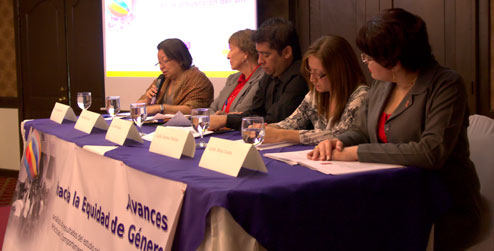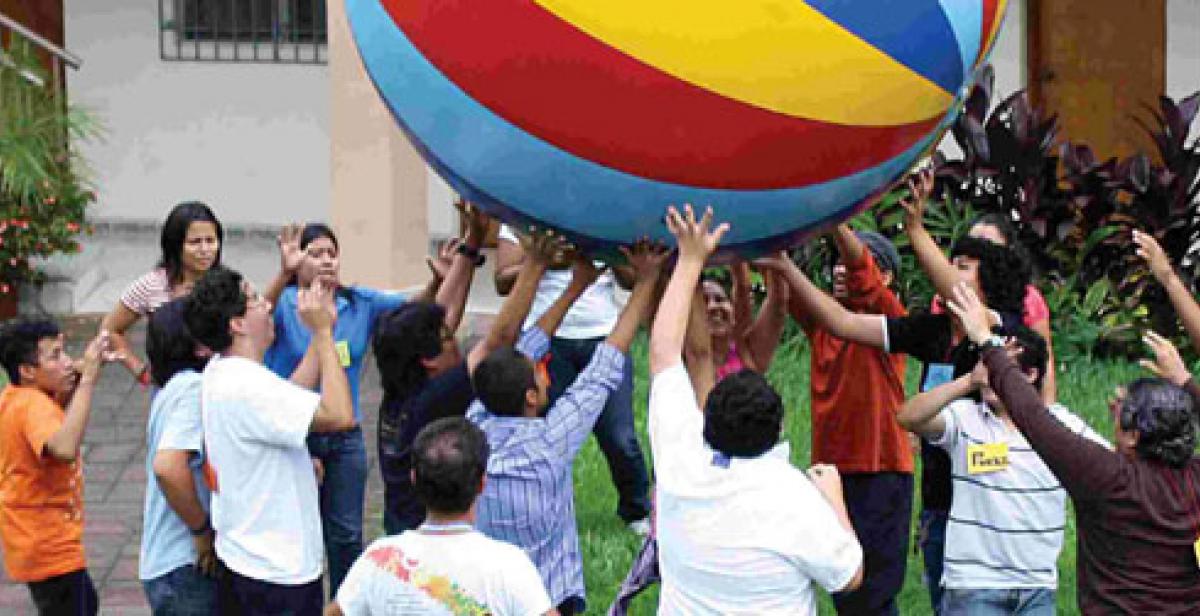Progressio El Salvador has celebrated the successful completion of its innovative HIV project funded by the European Union.
“We called the event [in November 2012] ‘Advances towards gender equity’,” says Progressio Country Representative Carmen Medina, “as this is also the name of the publication that we recently created which shows the project’s impact in relation to knowledge, attitudes and behaviours towards HIV.”
Development workers, local partners and Progressio staff were joined by key national figures in San Salvador to mark the closure of the project. This included the National STI/HIV Programme Coordinator, Dr Ana Isabel Nieto, widely recognised as the country’s highest authority on the subject area.
“It’s the first time that our contribution to public policy has been taken into account directly by relevant authorities within the government,” Carmen tells us. “Dr Nieto said that the training on gender and masculinities provided by the project team to staff within the Ministry of Health has been strategic for the gender mainstreaming in the National Plan on HIV prevention.”
 Above, from left to right: Dr Ana Isabel Nieto; Sister Maria Annel (founder of Progressio partner organisation CONTRASIDA); Progressio Development Worker Héctor Núñez (with partner organisation Centro Bartolomé de las Casas); Larissa Ventura (from the HIV department at the Human Rights Ombudsman Office of El Salvador); Rocío Costte (from the Sexual Diversity Department of the National STI, HIV & AIDS Programme, Ministry of Health, and participant in the Gender and Masculinities for the Prevention of HIV process).
Above, from left to right: Dr Ana Isabel Nieto; Sister Maria Annel (founder of Progressio partner organisation CONTRASIDA); Progressio Development Worker Héctor Núñez (with partner organisation Centro Bartolomé de las Casas); Larissa Ventura (from the HIV department at the Human Rights Ombudsman Office of El Salvador); Rocío Costte (from the Sexual Diversity Department of the National STI, HIV & AIDS Programme, Ministry of Health, and participant in the Gender and Masculinities for the Prevention of HIV process).
In a subsequent meeting with the National STI, HIV & AIDS team in January 2013, Dr Nieto congratulated the work carried out by the team, and said that the project’s publications had been shared with other key organisations, including UNAIDS, as up-to-date reference materials.
Over the course of three years, Progressio Development Workers placed with four local partner organisations have worked tirelessly to approach issues of HIV prevalence from a socio-cultural perspective. In recognising the integral role of gender relations in reinforcing and further compounding HIV transmission, the project has aimed to assess the role of men and women within Salvadoran society.
Through encouraging greater reflection on and exploration of the patriarchal system, its manifestations, and the cultures that uphold and reproduce it, the project set out a ground-breaking approach to tackling sexual transmission of HIV, which accounts for 98.3% of all infections within the country.
Cultural change is difficult to achieve, particularly in relation to roles and relations engrained over decades of practice. However, as one male participant in the work on masculinities explained following his involvement with the project: “I am feeling motivated to become the man that I want to be, a man that is responsible for his actions and behaviours…”
Speaking of the project’s completion, Carmen said: “We’ve had so many positive comments, and we feel so happy and proud to have reached this point; it hasn’t been easy, but it was worth it!”
Watch a video (in Spanish) in which male participants of a masculinities workshop answer the question: ‘In one word or phrase, what has participating in CONTRASIDA’s masculinities and HIV prevention process meant to you?’
You can also watch two longer videos on Youtube (both in Spanish):
A presentation of the masculinities and femininities work carried out by CONTRASIDA
The video runs for 17 minutes and comprises a summary of the intrinsic link between gender issues and HIV infection, the approach taken by the project to both men and women, the differences in methodologies used, testimonies from participants in CONTRASIDA’s activities, and hopes for the future. It includes input from the founder of CONTRASIDA and other key members of the organisation.
A discussion of the masculinities approach
This video runs for 24 minutes and offers a detailed description of the processes undergone and techniques used so as to implement a masculinities approach to HIV prevention. The conversation is carried out between Progressio’s Development Worker John Bayron Ochoa and Joel Córdova, a key facilitator for masculinities and HIV work at CONTRASIDA. It includes discussion on how to work on HIV with men, activities implemented, risk reduction, approaches to workshops, and the overall learning journey of participants.
The photo at the top of the page is taken from the front cover of the report 'ABC…G: Incluyendo género en la prevención del vih'
Download PDFs of the reports:
ABC…G: Incluyendo género en la prevención del vih
Estudio de opinión sobre conocimientos, actitudes, prácticas y comportamientos en relación al vih y sida en El Salvador
Avances hacia la Equidad de Género
Análisis de resultados del estudio sobre Conocimientos, Actitudes, Prácticas y Comportamientos en relación al vih




Comments
Hemos aprendido mucho, par
Hemos aprendido mucho, par modificar nuestras actuaciones al presente.